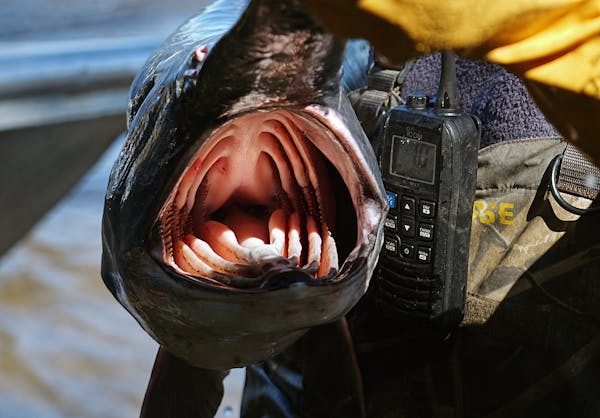The state plans to demolish an old and failing dam in Hinckley, Minn., a move that would restore the Grindstone River's natural flow but also disappoint those who have enjoyed the reservoir it created.
Removing the barrier would allow small mussels and ancient river giants such as sturgeon to return upstream for the first time in more than 100 years. It would also drain one of the only open waters in Hinckley, a city midway between Minneapolis and Duluth, and make a popular fishing pier that cost the state several hundred thousand dollars to build all but worthless.
"We're going to go from having this little lake and reservoir to just the stream that's left behind," Hinckley Mayor Don Zeman said. "The fishing pier for kids and kayaking is going to be out of the water, and the stream is going to be too shallow to really use."
Some form of dam has been at the site since the late 1800s, according to the Minnesota Department of Natural Resources. Dams have been used on the Grindstone, which feeds into the Kettle River, for logging and hydro-power. The state agency that became the DNR built the current dam in 1931 to provide a water source for game fish hatchery ponds.
The state built scores of small dams on rivers throughout Minnesota around that time for half-forgotten reasons that would never pass today's environmental standards. Some of the dams were likely built to prop up game fish or to reshape rivers and creeks to create better duck hunting spots. Some were built for long-closed saw-mills or in an unsuccessful attempt to stop common carp from spreading. In many cases, the dams built as carp barriers, ironically, may have actually helped them spread by killing off native predators and creating the murky oxygen-poor water in which they thrive, state wildlife officials believe.
As many of these dams reach the end of their intended life and require costly upgrades or complete rebuilds, state agencies have been working to methodically remove them and restore natural flows and fish passage whenever possible.
The DNR doesn't need the water from the Hinckley dam for game fish ponds anymore, said Jason Boyle, DNR dam safety engineer.
The dam received emergency repairs in 2014 to keep the concrete from collapsing and it still has long-term stability issues, he said. It has major cracks and exposed rebar as well as a "significant tilt," according to recent inspections.
"It's in bad shape," Boyle said.
It was also built with a hydraulic roller, which can create powerful and dangerous undertows at the bottom of the dam. Two people have drowned at the Hinckley site, according to state records.
Getting rid of the dam could allow for a host of species to return to parts of the Grindstone where they have long since disappeared, including sturgeon, paddlefish and rare mussels. There would be an uninterrupted connection from above the current dam through the Kettle River to the St. Croix River, one of the most diverse and pristine habitats for aquatic life in Minnesota.
But it wouldn't provide much new habitat, at least for now.
There is another dam about 8 river-miles upstream on the Grindstone from the Hinckley dam that would block any mussels or fish from spreading farther. Another dam a few miles upstream from that would keep any fish from reaching Grindstone Lake.
"It's very frustrating for us when the DNR says they want it natural and for these fish to come upstream because they're only going to be upstream for a few miles," Zeman said. "They can't go past that."
There are no plans to remove the other two barriers in the near future, according to the DNR. A final decision on removing the Hinckley dam hasn't been made, but Zeman believes there is little chance the agency will decide to keep and repair it.
The DNR finished its final environmental impact study on removal this month. If the agency moves forward it could soon start lining up bids and contractors and begin the demolition by this time next year.

Want to share info with the Star Tribune? How to do it securely

'Safe recovery sites' would offer syringes, naloxone and more to people using drugs. The plan could be in peril.
New Minnesota GOP leaders seek peace with party's anti-establishment wing

Who is Republican Lisa Demuth, Minnesota's first House speaker of color?

